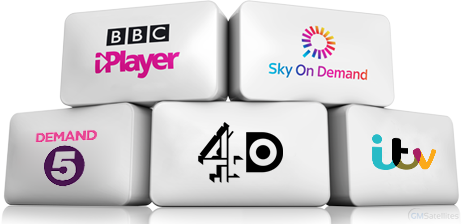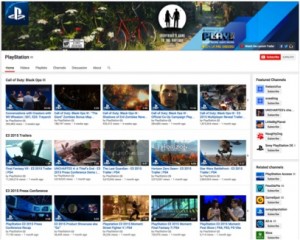
- Posted by info 19 Aug
The Rise of On Demand
In a digital age where the Internet has a strong hold over many of us, the use of online platforms is becoming essential to increasing brand popularity. In order to reach out to as many people as possible, a product or service must try to fulfil a wide range of needs. For example, the variety of ways we are now able to watch our favourite programs.
Gone are the days of being confined to scheduled television! It may take you a few moments to faintly remember a time when you had to shuffle your day in accordance to the TV guide. Of course, this is still an option, but it is not the only one available.
Television channels have been making the revolutionary move to the glorious world of Video on Demand (VoD) since 2006, when Channel 4 launched 4OD. The channel made its mark as the first UK broadcaster to make all of its original content available on demand, a step that has since seen ITV and the BBC to do the same.
After 8 years of a popular service, Channel 4 decided in March to re-vamp their on-demand platform and revealed a new brand identity called ‘All 4’. The brand sells itself as a new digital experience structured around 3 temporal states for the past, present and future; On Demand, Now, and On Soon.
In addition to streaming live TV and catching up on your favourite shows days after their original broadcast, Channel 4’s new service offers reminders for your upcoming shows and personal rewards. The options that are available online offer a more personal viewing experience, an attractive feature for consumers.
Regular viewing of live television is not dying out just yet. Many people still love the suspense created at the end of a program upon when they have to wait a whole week to find out who did it. However, branching out onto different platforms is simply allowing channels to offer more options for everyone. All 4 and iPlayer are easily accessible on consoles such as PlayStation 3 and Xbox One.
A recent article published by The Guardian brought multiple platforms to attention (http://www.theguardian.com/media/2015/jul/28/itv-profits-up-25-despite-continuing-decline-in-ratings), claiming that ITV had profited up to 25% despite the on-going decline in their ratings. Viewing numbers may have dropped for live television, but the company still managed to do well for themselves, suggesting that their use of multiple platforms has enabled this.
BBC iPlayer launched on Christmas Day 2007 and has received a great reception since then. However, recent figures show that in March, viewing figures fell by 7%, with the suggested cause being that Netflix had overtaken the BBC for online streaming.
Netflix are quickly becoming the giants of online television; the ultimate competition for companies such as Channel 4 and ITV. In 2014, Netflix alone was the second largest driver of online traffic in the UK and Ireland. It accounted for 17.8% of all internet traffic that year. The company has reached unbelievable success across the world since it started as a DVD rental company in 1997 and introduced streaming 10 years later.
With its exclusive series, sometimes made and funded by the company themselves, and a huge variety of genres for consumers to choose from, it’s no wonder that Netflix has gained such a great reputation. However, in comparison to the likes of All 4 and ITV Player, Netflix is costing users a lot more money. Whereas All 4 will provide users with the latest shows, the majority of Netflix’s content is at least one year old. Despite this, Netflix is a prime example of the rise of on-demand TV and why companies need to expand to different platforms.
Another prime example is undoubtedly YouTube. A study conducted by Frank N. Magid Associates (http://www.cnet.com/news/where-do-the-most-people-go-for-tv-online-youtube/) revealed that YouTube is the number 1 destination for viewing online television. Users are discovering more to the site than music videos, and companies are realising the advantages and importance of using YouTube.
Channel 4 and All 4, still named 4od on YouTube, have created multiple YouTube channels for the different genres and programs they show. Channel 4’s main YouTube channel boasts of 191,541 subscribers, and contains episodes of shows such as the ever-popular Countdown. With such a wide range of options for television viewing, where do we turn?
With the evident success of television companies turning to on-demand and YouTube, it only makes sense that different companies begin to branch out to using different platforms to promote their brand. One brand successfully making the most of YouTube is Sony PlayStation. The channel has been named as ‘one of the best brand channels’ (http://www.adweek.com/videowatch/10-best-brand-channels-youtube-156690), with almost 3500 videos that always show the PlayStation logo in the bottom left corner of the screen.
Online platforms provide plenty of exposure for brands, and websites such as YouTube charge nothing for video uploads. YouTube videos also introduce interactivity y between the brand and customer, allowing them to comment on videos and share them to other social networks. AYTM Market Research (http://www.emarketer.com/Article/Just-How-Popular-YouTube/1009787) found that around 60% of internet users visited YouTube at least once a week in March 2013. Out of this percentage, 22% visited YouTube every day, and nearly 30% visited the site a few times in a week. Making a video on a low budget combined with a free upload for the millions of YouTube videos to watch seems to be the most beneficial move for a company to make.
For companies, video marketing is a way to bring the brand to life. 2015 is a time where we look to the quickest and most convenient ways to do tasks, as we have become so accustomed to the ease of technology. What is more convenient than watching a program when you have spare time? What could be more easy than watching that documentary you’ve been waiting to watch whilst you lay on a sunbed on holiday?
Television on demand is becoming competitive between companies, and is a highly popular service at that. Online platforms are presenting an accessible and easy way for brands to promote themselves and companies to introduce more interactivity with customers. It’s safe to say, on demand is in demand!
Please note: Images are for reference purposes only.





Post Comments 0